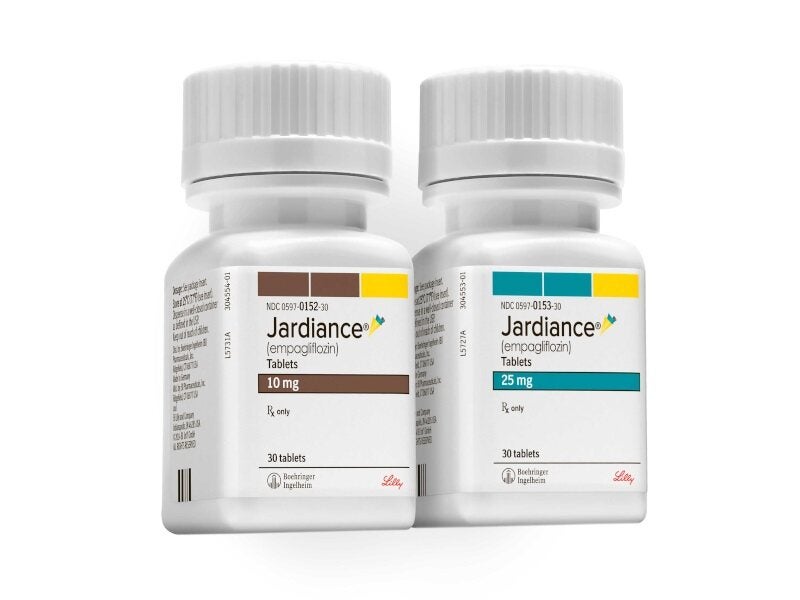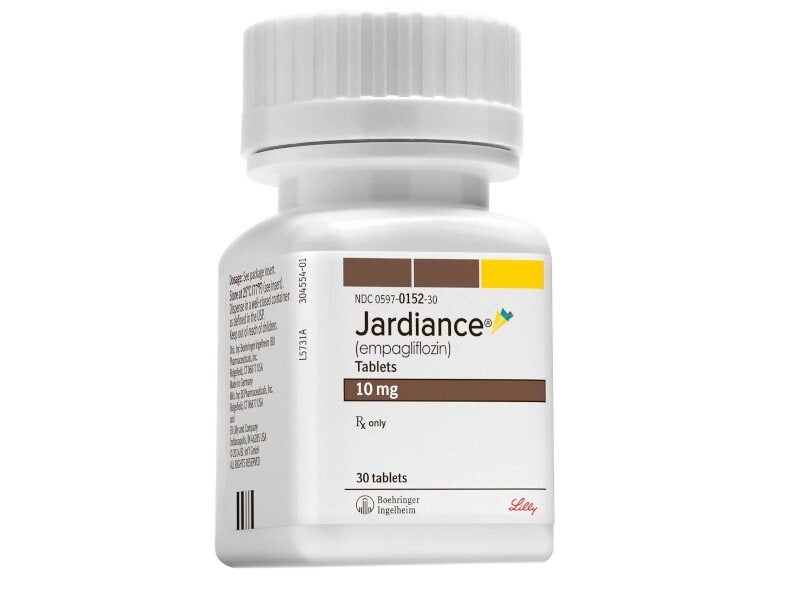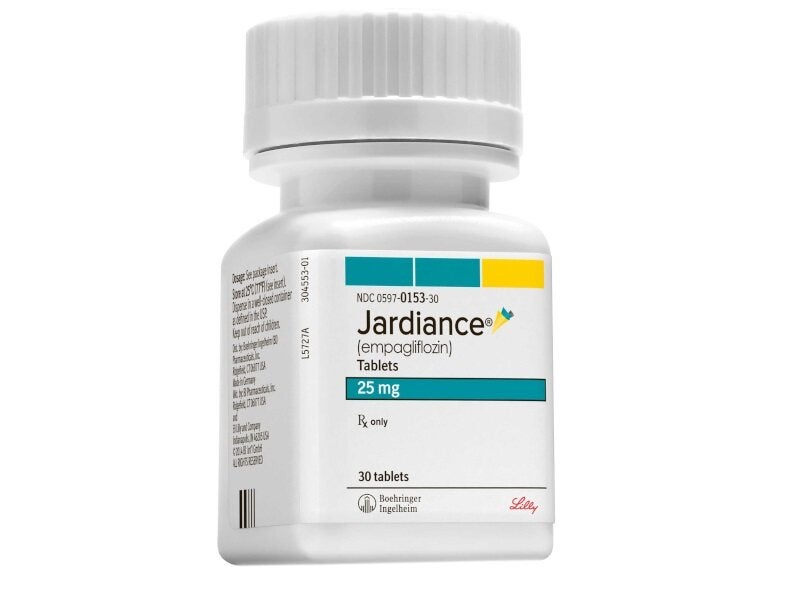Jardiance (empagliflozin) is a sodium-glucose co-transporter 2 (SGLT2) inhibitor approved for the treatment of Type 2 diabetes mellitus in adults and children aged ten years and older as an adjunct to diet and exercise.
The drug is also indicated to lower the likelihood of cardiovascular death and hospitalisation due to heart failure in adult patients with this medical condition, and to decrease the risk of cardiovascular death in adult patients with Type 2 diabetes and pre-existing cardiovascular conditions.
The drug is developed and marketed by Boehringer Ingelheim, a pharmaceutical company based in Germany, in collaboration with US-based pharmaceutical company Eli Lilly.
Jardiance is available as a film-coated, biconvex, pale-yellow-coloured tablet in 10mg and 25mg strengths for oral administration. The 10mg tablets are round shaped while the 25mg tablets are oval shaped.
Regulatory approvals for Jardiance
Jardiance was first approved in Australia in April 2014 as an adjunct to diet and exercise to improve glycaemic control in adults with Type 2 diabetes mellitus.
Empagliflozin received marketing authorisation from the European Commission (EC) to treat Type 2 diabetes in adults in the EU in May 2014.
The EC approved empagliflozin’s 10mg and 25mg once-daily tablets for use when either diet and exercise alone are not sufficient to control blood sugar levels, or when the patient is intolerant to metformin alongside other glucose-controlling medicines such as insulin.
The US Food and Drug Administration (FDA) approved the drug for the condition in August 2014, while Health Canada approved Jardiance for adults with Type 2 diabetes whose glucose control is inadequate, in August 2015.
Health Canada expanded the label as an add-on combination to lower the occurrence of cardiovascular death in patients with Type 2 diabetes mellitus and a confirmed history of cardiovascular disease, in 2016.
The drug was also approved by the FDA and the EC to reduce the risk of patients with Type 2 diabetes developing cardiovascular disease in December 2016 and January 2017, respectively. The approval was based on the positive results from the EMPA-REG OUTCOME trial.
The FDA granted approval for Jardiance in 10mg to lower the likelihood of cardiovascular death and hospitalisation due to heart failure in adult patients suffering from heart failure characterised by reduced ejection fraction (HFrEF) in August 2021.
Health Canada approved the drug as a supplementary treatment alongside standard care/therapy in adults with an estimated glomerular filtration rate as low as 20ml a minute/1.73m2 for the management of heart failure with HFrEF, in November 2021.
In January 2023, the FDA accepted the supplemental new drug application for Jardiance, to reduce the risk of kidney disease progression and cardiovascular death in adults with chronic kidney disease.
In June 2023, the FDA approved the drug as the first and the only SGLT2 inhibitor to decrease blood glucose levels along with exercise and diet in children aged ten years and above with Type 2 diabetes, based on the DINAMO Phase III clinical trial.
The drug is also approved in several other countries such as China and Japan.
Type 2 diabetes causes
Also known as non-insulin dependent diabetes, Type 2 diabetes is a condition where the body is unable to use the insulin it produces efficiently, which eventually leads to insulin deficiency. It accounts for 90% to 95% of all diabetic cases.
Type 2 diabetes is more likely to affect people that are elderly, obese, or have a history of the disease in their family.
Approximately 29 million Americans and an estimated 382 million people worldwide are diagnosed with either Type 1 or Type 2 diabetes.
Jardiance’s mechanism of action
Jardiance consists of empagliflozin, an SGLT2 selective and reversible inhibitor.
Type 2 diabetes is affected by higher blood sugar levels due to a greater presence of SGLT2 proteins, which are responsible for the reabsorption of glucose into the bloodstream.
Jardiance reduces glucose reabsorption capacity in the kidneys, which results in urinary glucose excretion and controls blood sugar levels. Unlike other Type 2 diabetes drugs, empagliflozin and other SGLT2 inhibitor-class drugs work independently of beta-cell function and insulin pathways.
Clinical trials of Jardiance
The FDA’s approval for Jardiance was based on two Phase III clinical trials conducted on Type 2 diabetics. One trial compared the efficacy of Jardiance as a monotherapy with placebo while the other tested the drug in combination with other diabetes drugs such as metformin, sulfonylurea, pioglitazone, and insulin.
The results showed a significant reduction in the haemoglobin A1c (HbA1c) levels of Type 2 diabetes patients.
The first trial was a double-blind, placebo-controlled study that enrolled 986 Type 2 diabetes patients to evaluate the safety and efficacy of Jardiance in comparison with placebo.
The subjects initially entered a two-week open-label placebo run-in period. At the end of the second week, patients with inadequately controlled Type 2 diabetes and haemoglobin levels between 7% and 10% were randomised to either receive Jardiance 10mg, Jardiance 25mg, placebo, or a reference comparator.
Measured during the 24th week of the study, the results demonstrated significant reductions in HbA1c levels, fasting glucose levels, and body weight in subjects treated with Jardiance compared with placebo-treated patients.
The second study was a double-blind, placebo-controlled study that enrolled 637 Type 2 diabetes patients to evaluate the safety and efficacy of Jardiance in combination with metformin.
In the study, subjects with inadequately controlled blood sugar levels while taking at least 1,500mg of metformin per day entered an open-label two-week placebo run-in period. At the end of the two weeks, the subjects were randomised to placebo and Jardiance.
Measured during the 24th week of the study, the results similarly demonstrated significant reductions in HbA1c levels, fasting glucose levels, and body weight in subjects treated with Jardiance compared with those treated with a placebo.
The EMPA-REG OUTCOME clinical trial was a long-term, multi-centre, randomised, double-blind placebo-controlled trial that enrolled approximately 7,000 Type 2 diabetes patients with cardiovascular disease from 42 countries.
The trial demonstrated a 38% decrease in deaths from cardiovascular disease and a 32% decrease in mortality in patients receiving Jardiance compared to placebo for 3.1 years.
The trial also demonstrated a positive impact of Jardiance in extending the lifespan of patients with Type 2 diabetes and cardiovascular disease by one to four and a half years, compared with placebo.
The most common adverse effects recorded were urinary tract infections and vaginal yeast infections. Hypoglycaemia was commonly reported in patients who received a combination of Jardiance and sulfonylurea or insulin.
Other side effects included physical weakness, headaches, confusion, hunger, drowsiness, sweating, kidney problems, and a rise in cholesterol.





